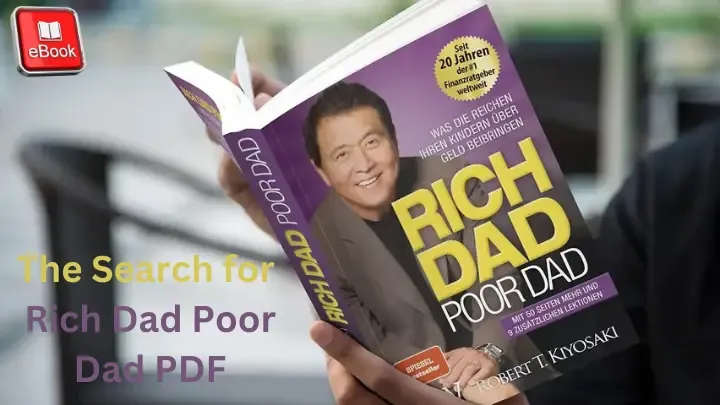The Search for Rich Dad Poor Dad PDF
Unveiling the Hidden Treasures: The Search for "Rich Dad Poor Dad PDF
So, you're on the prowl for the hidden gems of financial wisdom, diving into the depths of the internet in search of the elusive "Rich Dad Poor Dad PDF." Well, buckle up, fellow seeker of financial enlightenment, because we're about to embark on a journey that will make your bank account do a happy dance.
Cracking the Code: Decoding "Rich Dad Poor Dad PDF"
Unleashing the Power of Knowledge
In the vast landscape of the web, finding the right treasure sometimes feels like chasing fireflies on a summer night. "Rich Dad Poor Dad PDF" – it's not just a search; it's a quest for the keys to the kingdom of financial prowess.
What's the Buzz About?
Ever wondered why everyone's buzzing about this financial masterpiece? Brace yourself; we're diving into the depths of Robert Kiyosaki's world, where financial strategies are sharper than a double-edged sword.
The Quest Begins: Navigating the Virtual Jungle
1. Unveiling Rich Dad's Legacy
In the jungle of digital bytes, Rich Dad's legacy is the hidden gem we all seek. This is not just a book; it's a roadmap to financial wisdom. Our first stop on this adventure? Understanding what makes Rich Dad's teachings stand out in the financial wilderness.
Why PDF?
In a world where information is a click away, why the fuss about a PDF? Well, my friend, a PDF is your ticket to uninterrupted enlightenment. No ads, no distractions – just you, your device, and the wisdom of Rich Dad.
2. Navigating the Labyrinth: The Search for the PDF
Now that we're armed with the knowledge of why a PDF is the Holy Grail, let's talk tactics. In a world where algorithms play hard to get, how do you outsmart them and get your hands on the coveted "Rich Dad Poor Dad PDF"?
Google's Secret Garden
Google – our trusty guide in this quest. Picture it as a treasure map; you type, it guides. But ah, the trick lies in the keywords. "Rich Dad Poor Dad PDF" – make it your incantation, and watch the virtual doors swing open.
Avoiding the Quicksand: Common Pitfalls in the Quest
1. The Clickbait Swamp
Beware, young Padawan, for the internet is rife with clickbait. Promises of free PDFs that lead you down a dark alley of broken links and disappointment. Stick to reputable sources; the PDF is a gem, not a bait.
2. The Scam Oasis
In this vast digital desert, scams are the mirages promising an oasis. Remember, you're seeking enlightenment, not getting caught in a mirage. Trust your instincts and steer clear of anything too good to be true.
Conclusion: The Elusive PDF and Your Victory Dance
In the realm of "Rich Dad Poor Dad," the PDF is not just a file; it's the passport to a financial paradigm shift. Armed with the right keywords, a savvy search strategy, and a keen eye for pitfalls, you're now ready to conquer the virtual jungle.
So, fellow seeker, go forth and claim your PDF. Let the knowledge within be the wind beneath your financial wings. May your pockets be deep, your investments wise, and your journey to financial freedom as thrilling as the quest for the "Rich Dad Poor Dad PDF" itself. Happy hunting!
Why is Rich Dad Poor Dad a bad book?
Views on Robert Kiyosaki's book "Rich Dad Poor Dad" differ, and whether or not it is seen as a "bad" book relies on the viewpoint of the reader. Here are a few such objections:
Absence of Specific Guidance
Some claim that the book is devoid of practical, targeted guidance. Some readers believe that while if it encourages entrepreneurship and financial independence, there aren't enough concrete methods for reaching these objectives.
Is Rich Dad Poor Dad worth reading?
Rich Dad Poor Dad" by Robert Kiyosaki is a popular personal finance and self-help book that has gained a significant following since its publication. The book contrasts the financial philosophies and practices of two father figures: the author's biological father (referred to as "Poor Dad") and the father of his childhood best friend (referred to as "Rich Dad").
Here are some points to consider when deciding if "Rich Dad Poor Dad" is worth reading:
Perspective on Wealth: The book challenges traditional views on wealth and encourages readers to think differently about money, assets, and financial independence. It introduces concepts such as assets and liabilities, emphasizing the importance of investing and building passive income streams.
Motivational Content: "Rich Dad Poor Dad" contains motivational and inspirational content, encouraging readers to take control of their financial destinies and strive for financial education and independence.
Simplicity of Concepts: The book presents financial concepts in a
straightforward and easily understandable manner. This makes it
accessible to readers with varying levels of financial knowledge.
Criticism: Despite its popularity, the book has received criticism for lacking specific, actionable advice. Some argue that it's more of a motivational book than a practical guide to wealth-building.
Individual Preferences: Whether you find the book valuable may depend on your personal financial philosophy and goals. Some people resonate strongly with Kiyosaki's ideas, while others may not find them as applicable or relevant to their situations.
Ultimately, "Rich Dad Poor Dad" has had a positive impact on many readers, particularly those who are looking for a mindset shift regarding money. If you're open to new perspectives on wealth and financial independence, you might find it worthwhile. However, it's always a good idea to supplement such readings with a variety of financial resources and perspectives to form a well-rounded understanding of personal finance.
What will Rich Dad Poor Dad teach you?
"Rich Dad Poor Dad" is a personal finance and self-help book written by Robert T. Kiyosaki. The book is structured as a memoir and is based on Kiyosaki's own life experiences. Here are some key lessons that "Rich Dad Poor Dad" aims to teach:
The Importance of Financial Education:
Kiyosaki emphasizes the importance of financial education and how it can be more valuable than traditional academic education. He suggests that understanding money, investing, and how to make it work for you is crucial for financial success.
The Difference Between Assets and Liabilities:
Kiyosaki introduces the concept of assets and liabilities, emphasizing the need to acquire assets that put money in your pocket rather than liabilities that take money out. This is a fundamental principle for building wealth.
The Rat Race and Breaking Free:
The book discusses the "rat race," where individuals work hard for a paycheck but often struggle financially. Kiyosaki encourages readers to break free from this cycle by creating passive income streams through investments and entrepreneurship.
The Power of Entrepreneurship:
Kiyosaki promotes the idea of entrepreneurship and creating your own business to achieve financial independence. He argues that being an employee might not lead to true financial freedom, and entrepreneurship offers greater control over your financial destiny.
Risk-Taking and Overcoming Fear:
"Rich Dad Poor Dad" advocates for taking calculated risks and overcoming the fear of failure. Kiyosaki suggests that financial success often involves stepping outside of your comfort zone and learning from both successes and failures.
Building and Protecting Wealth:
The book provides insights into how to build and protect wealth. Kiyosaki discusses the importance of investing wisely, making informed financial decisions, and understanding the difference between good and bad debt.
Mindset Shift:
Kiyosaki emphasizes the need for a mindset shift, moving from a focus on job security and a steady paycheck to a mindset centered around financial independence and wealth-building.
The Role of Taxes and Debt:
The book touches on the impact of taxes and debt on personal finances. Kiyosaki suggests that understanding and strategically managing taxes and debt can be essential in building wealth.
It's important to note that while "Rich Dad Poor Dad" has been influential for many people, it also has its critics, and not everyone agrees with all of Kiyosaki's views. Readers are encouraged to approach the book with an open mind and consider how its principles might apply to their own financial situation and goals.
What is the key point of Rich Dad Poor Dad?
In "Rich Dad Poor Dad," Robert Kiyosaki challenges conventional wisdom around money and wealth while highlighting the value of financial education. In order to highlight the disparities in the financial practices and ideas that each of Kiyosaki's "rich dad" (his friend's father) and "poor dad" (his real father) accepted, the book compares and contrasts them.
Here are some salient ideas from the text:
Liabilities vs. Assets: In his introduction to the idea of assets and liabilities, Kiyosaki stresses the value of amassing income-producing assets as opposed to liabilities.
Financial Education's Significance: The book emphasizes the importance of financial education and how it can help readers make wise financial decisions.
Entrepreneurial Mindset: Rather than depending only on money obtained from a job, "Rich Dad Poor Dad" promotes developing an entrepreneurial mindset and looking for chances to generate passive income.
Taking Calculated Risks, Learning from Mistakes, and Not Being Afraid to Step Outside of One's Comfort Zone in the Pursuit of Financial Success are all points that Kiyosaki emphasizes.
Work to Learn, Not Just to Earn: The book makes the argument that working is important for gaining experience, information, and abilities that can help one succeed financially in the long run in addition to just getting paid.
Mindset Shift: Kiyosaki urges readers to question social norms and cultivate a mindset that is consistent with financial independence by challenging conventional views about money, work, and success.
Despite receiving mixed reviews, "Rich Dad Poor Dad" has grown to be a well-known and significant work in the self-help and personal finance fields. It has inspired a lot of individuals to reconsider how they handle money and work toward becoming financially independent and literate.






